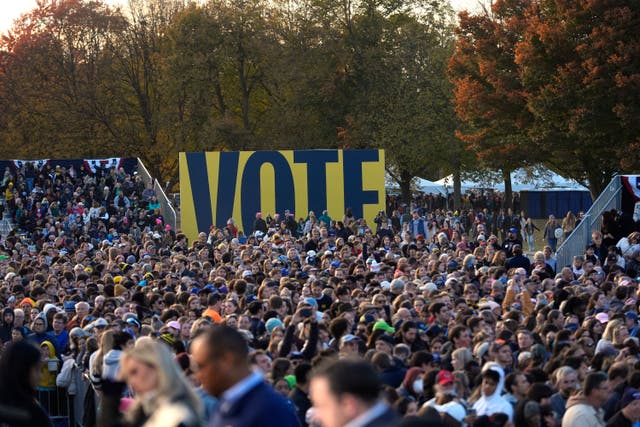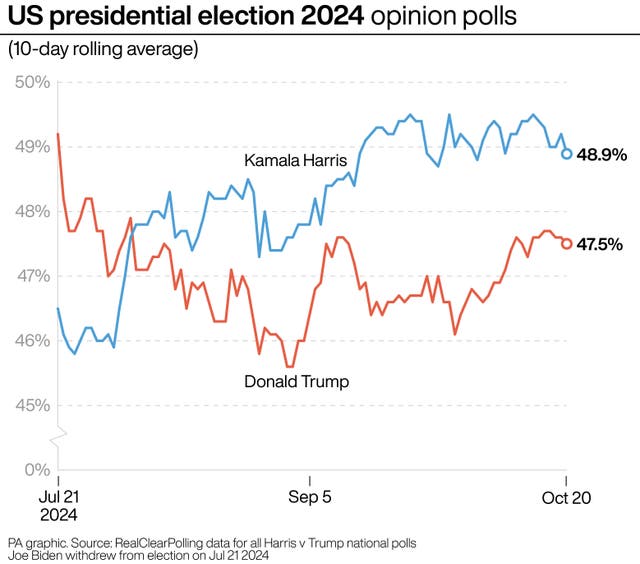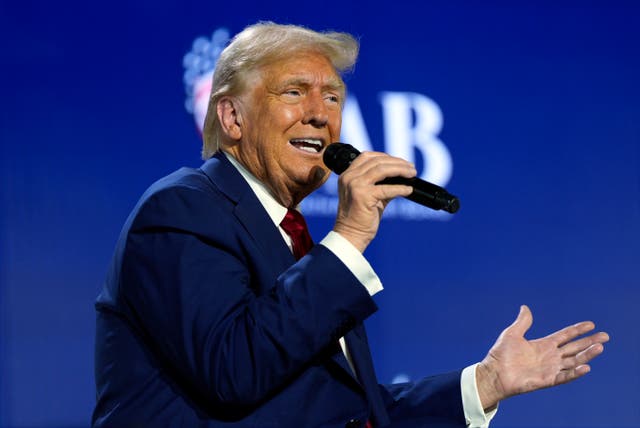Harris courts Michigan’s working-class voters on second visit in three days
She contrasted her support for labour unions to former president Donald Trump, her Republican rival.

US Vice President Kamala Harris courted Michigan’s working-class voters on Monday, highlighting the administration’s work to bring more factory jobs to the state and her support for labour unions.
“I’m here, I’m here for you,” the Democratic presidential nominee told workers after she toured an International Union of Painters and Allied Trades training facility.
She contrasted her support for labour unions to former president Donald Trump, her Republican rival.
“He’s not working for or concerned about working people, middle-class people,” Ms Harris said of Mr Trump.

She specifically criticised the way Mr Trump filled the National Labour Relations Board, the federal agency that enforces labour laws in the United States, with anti-union figures, a frequent criticism levied against Mr Trump by union members.
She also criticised Mr Trump for lauding ally Elon Musk, the businessman and owner of the social media platform X, for discussing firing striking workers.
Earlier in Saginaw, she toured a semiconductor factory to emphasise how government funding for computer chip manufacturers could create factory jobs in Michigan, where she and Mr Trump have been fighting to win in the upcoming election.
She visited days after Mr Trump criticised the bipartisan 2022 law that provides the federal money and said he would rather just charge tariffs.
Last week, the Commerce Department said Hemlock Semiconductor would receive up to 325 million dollars (£250 million) in direct support to build a new factory making hyper-pure polysilicon, a building block for electronics and solar panels, among other technologies. The new facility would add 180 factory jobs in Michigan.
Ms Harris told workers there that the United States has to keep pushing forward.
“We have to constantly be on top of what is happening, what is current, and investing in industries of the future as well as honouring the traditions and the industries that have built up America’s economy,” she said. “And what you all are doing here is exactly that.”

The vice president was also holding a campaign rally later on Monday in Ann Arbor, home to the University of Michigan and a large pool of college graduates, an increasingly large Democratic constituency. The event will feature singer-songwriter Maggie Rogers.
Beyond Monday’s focus on manufacturing, Ms Harris has been using the closing days of the election to press multiple messages with diverse groups of voters.
For black and Latino men, she has played up forgivable loans for small businesses, among other economic policies.
At a Friday rally in Houston with singer Beyonce, she stressed for women her support for abortion rights. And hanging over all of that, Ms Harris has said she believes Mr Trump is a fascist and a threat to democracy.
As of August, the CHIPS and Science Act had provided 30 billion dollars (£23 billion) in support for 23 projects in 15 states that would add 115,000 manufacturing and construction jobs, according to the Commerce Department.
That funding helped to draw in private capital and would enable the US to produce 30% of the world’s most advanced computer chips, up from 0% when the Biden-Harris administration succeeded Mr Trump’s presidency.
Still, Mr Trump attacked the policy in a Friday night interview recorded for The Joe Rogan Experience, a popular podcast.
“We put up billions of dollars for rich companies to come in and borrow the money and build chip companies here, and they’re not going to give us the good companies anyway,” the Republican nominee told the podcast.
In fact, the money has gone to industry leaders such as Taiwan Semiconductor Manufacturing Co, Samsung, Micron, Intel and GlobalFoundries to open factories in the US.
Mr Trump said he would instead hike tariffs on foreign-made computer chips, saying the financial penalties would cause companies to relocate to the United States.
“You tariff it so high that they will come and build their chips companies for nothing,” the former president said.
Most economists have said tariffs would contribute to rising inflation. Higher prices on computer chips could add to the costs of cars, kitchen appliances, phones and other goods.
US consumers experienced that previously coming out of the pandemic because of a global computer chip shortage.

Mr Trump’s Atlanta rally on Monday evening is being held at McCamish Pavilion, across the street from the CNN studios where Mr Trump and Joe Biden had their campaign-defining debate just four months ago.
Mr Biden’s disjointed performance highlighted the 81-year-old president’s age and led ultimately to him dropping out of the race.
Earlier on Monday, Mr Trump talked about his experience with faith and fatherhood at the National Faith Advisory Board summit.
He recounted his upbringing in New York, saying that he at times enjoyed religious ceremonies but broadly sidestepped questions of his own faith.
Mr Trump praised conservative Christians as a key part of his administration and said that a revamped office of faith would have a direct line into the Oval Office.
He also promised to repeal the Johnson Amendment, which bars certain nonprofit organisations from supporting or opposing political candidates.
“I shouldn’t scold anyone, but Christians aren’t known for being very solid voters,” Mr Trump said to the crowd.
“We have to save religion in this country. No, honestly, religion is under threat,” he warned.





